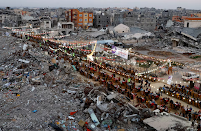According to The Jerusalem Post, many people in Israel are
convinced that over the past week, Hamas has won a “hunger narrative”. Countries
like France and Britain are talking about recognizing the state of Palestine at
the UN General Assembly in September.
Israel says Hamas are liars, they fake evidence, ride in
ambulances, and hide in schools, and much of the world is fooled, and some UN
agency workers are complicit.
The single image that may have shifted global perception
most in recent weeks was of a supposedly starving Gaza boy, later revealed to
have had a severe pre-existing condition. Millions saw the image; thousands saw
the correction. Yes, it’s journalistic malpractice, and yes, it’s quite unfair.
Yet none of that changes the underlying reality. There is no
winning the semantic argument over whether what’s happening in Gaza constitutes
hunger, malnutrition, starvation, or famine. What’s beyond debate is that
people are suffering – from lack of access to food, but also medicine, shelter,
and a functioning infrastructure. Gaza, much of which is literally destroyed,
is not self-sufficient.
Meanwhile, Israel is using its own narrative that is certainly
no less dishonest. Many Israelis argue that no one should be required to send
aid to their enemy. However, this war is nearly unprecedented, an enemy
territory, fully sealed off, governed by a terrorist group that feeds off the
suffering of its own population.
In
addition, when Israeli ministers – including Itamar Ben-Gvir just
last weekend – openly call for all aid to be halted, it becomes impossible to
deny that collective punishment has been normalized. That call alone will be
widely seen as a war crime under the Fourth Geneva Convention.
Gaza is blockaded from every direction by both Israel and
Egypt. Civilians can’t leave — not to Israel, not to Egypt. In Gaza, millions
of innocents are trapped.
Meanwhile, Israel has been moving much of the population
around, more or less like cattle, for 21 months. They’ve been herded here, told
to concentrate there. There’s talk of a so-called “humanitarian city” that
would be a tent camp for a million people. People speak seriously of getting
the Gazans to all leave.
Yet no country has agreed to take them, and nobody serious
will view people leaving a bombed-out ruin as having done so willingly. All of
this will be viewed as massive ethnic cleansing. Meanwhile, the idea of Israeli
settlements in Gaza is being floated again – another war crime, normalized in
real time.
How many Israelis would have supported, after October 07,
a war that drags on for two years, kills tens of thousands of innocent people
and hundreds of IDF soldiers, and does not prioritize the return of the
hostages?
How many are really prepared for the coming legal complications
for everyday Israeli citizens as they travel?
Yet
this madness has been normalized, not because the public truly supports it, but
because of the nonstop propaganda drumbeat inside the country. Outside, Israel
still has friends – because its case against Hamas is excellent – but only a
few who agree with the war policy, and that includes Jews and Zionists who are
in no way fooled by Hamas.
Inside Israel, the normalization of madness has been built
on three main pillars.
First, the narrative that there are “no innocents in Gaza.”
It’s probably true that most people in Gaza hate Israel. The idea that it makes
them combatants – and that this extends to little children (something I’ve
tried to argue against on TV panels with seemingly sane people who claimed it)
– is grotesque. No one outside of Israel buys it, and it is exactly the kind of
discourse that has driven the charges of genocide. Israel’s supporters are
mostly reduced to claiming this is a fringe view; very sadly, it is not.
Second, the Israeli media rarely shows the full horror of
what’s happening in Gaza. Editors know what their audience wants. Many Israelis
lack patience for scenes of Palestinian suffering, in part because the “no
innocents” narrative has taken root, in part because they have accepted that
war is terrible, and in part due to their own trauma. So even if most people
know what’s happening on some level, they don’t feel it.
Third, there’s the deeply embedded belief that this is all
Hamas’s fault. Hamas started the war, and Hamas could end it by surrendering.
But Hamas is a terrorist group that doesn’t care about people, and Israel is a
sovereign state that thinks it’s a light unto the nations. Israel was supposed
to be the adult in the room. It needed to find a better way – or at the very
least to make this one quick and decisive.
Instead, Prime Minister Benjamin Netanyahu has engineered a
long war. Every off-ramp has been rejected. “Day after” planning has been
blocked. The Palestinian Authority – the only plausible alternative to Hamas –
has been relentlessly undermined and demonized (even as it continues, daily,
its security coordination with the IDF in the West Bank).
The extremists who dominate the coalition don’t want an alternative.
They want to occupy Gaza, resettle it, and push out its population.
Netanyahu has also insisted that accountability for October
7 must wait until the war ends. The strategy has been to gaslight, obfuscate,
and confuse with propaganda and moral gray zones, to a tragic extent, it has
worked. That’s why the streets are not full of people demanding an end.
The foreign media has had no unimpeded access to Gaza since
the start of the war – only a small number of tightly controlled “embeds”. As a
result, international outlets are forced to rely on reports from Palestinian
journalists, and then Israel complains that those reports are biased.
Israel fears that letting foreign journalists in would put
them at risk and that if any were killed, Israel would be blamed.



















